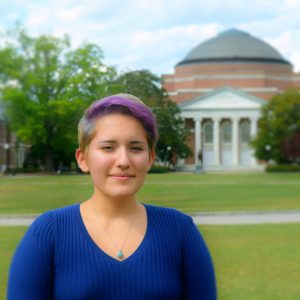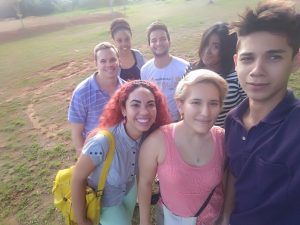By: Adaír Citlalli Necalli
Note: The blog has updated this post to include Adair’s TEDx Duke Talk on the colonizing biases of European history and importance of listening to and valuing Nahua native speakers, and First Nations more generally, in our historical, literary, and ethnographic research about them. The issues raised in her talk go to the heart of educational initiatives like Brazil’s Lei 10.639/03 mandating teaching of Afro-Brazilian history in Brazil’s public schools.

I took my first Portuguese class during my first year of college just for fun. I wanted to learn a new language, and I already spoke Spanish, so I could take the accelerated learning track. I also wanted to see Brazil someday. That had always been a dream of mine, and now that I was the first in my family to go to college, I wanted to take advantage of the opportunities available to me at a place like Duke University.
I also wanted to do academic research someday. I was interested in linguistics, language education and education policy in general, and I was interested in this on a global scale. How do people around the world teach their children? How do different governments around the world value or devalue education for different groups of people in their country? And why does it matter?
So, when I came across the Bass Connections research team, “The Cost of Opportunity? Higher Education in the Baixada Fluminense,” it was perfect. I applied immediately, hoping they would consider taking a first-year student into the team. I didn’t expect to be the longest-standing member of the team two years later.
I am now entering my last year at Duke University, and this team, which has been such a large part of my time at Duke, is coming to a close. All I can do is be grateful for the experiences and opportunities for growth it has given me, both personal and academic.
It is easy for me to just explain that the research methodologies used on this team are the reason why I am able to do my own independent research as a third- and fourth-year now at Duke. Learning how to take field notes, take interviews, modify interview questions on the fly based on what my interviewee needs or wants, analyze and present on these interviews, do census research, statistical analysis, understand survey data, and get along with your research team throughout all of this – people spend entire careers trying to pick up all of these skills! This research team taught it all to me in two years. It’s the reason why I was able to win the Mellon Mays Undergraduate Fellowship as well as the Mellon Award for summer research in Latinx Studies. On top of it all, I also got to learn how to put together a whole conference including international guests and how to present at others’ conferences as well, which will serve me immensely going forward in my academic career.
But it would be too easy to just stop there. Of course I learned these research skills. That is one of the main goals of Bass Connections for undergraduates, and I am incredibly grateful that I got to have that experience. However, I would argue that the majority of what I learned has been non-academic.

I can still remember each and every favela we saw, and I remember thinking, that’s not too different from my mom’s pueblo back home. I remember meeting the students at UFRRJ who were low-income, and bonding with them over how hard getting a university education is when you need to put food on the table. I remember my gratitude to my scholarship when the students we collaborated with explained how much of a difference it makes to not have to worry about getting lunch at school because UFRRJ has a cafeteria. I remember understanding all too well when these students described a government that didn’t care about the poor or the indigenous or the black and brown; I would describe both Mexico and the U.S. in the same way.
But I also remember the first time we stepped into an AirBnB apartment in an apartment tower, looking over the streets of Rio de Janeiro, and realizing that if you lived up here – so high up in the sky – and never had to worry a day in your life about your ability to succeed in this country, you would never think that there was anything wrong with Brazil. This country looked perfect from a bird’s eye view.
I also remember the first day I realized just how much privilege I held in Brazil when I traveled there as a researcher with this team. Personally, I had never been high-income. I had always been a Mexican immigrant; a person of indigenous descent; a person of color. I had always been the subject of another institution’s decisions. But here, in Brazil, with a student ID that said Duke University, professors with a grant that covered our trip, and my light-brown skin that was basically considered white in the Baixada, I had privilege. So much of it. It truly took me a long time to process it.
I am grateful for encountering the need to understand that, though. Today, I research Nahuatl revitalization programs in Mexico to try to understand how we can improve their success rates. Nahuatl is an indigenous language in Mexico; the indigenous people who speak the language are called Nahua people. I am of Nahua descent myself, and that is why this work is so incredibly important to me. However, when I went on my first trip to Puebla during the summer after my second year, I don’t think I would have understood my place in these communities as well as I did if I had not been to Brazil the summer prior.
In the indigenous communities of Puebla, I am a university student with a grant that covers my trip. My skin is much lighter than many of the people who live there because I am mixed-race. That creates a dynamic that I need to address when I interview people. Once I do, though, and I explain that I have Nahua ancestry myself, and that that is why I work on this topic, my interviews always go successfully. I have created deep bonds with many people in the communities I care about in Puebla, and I am grateful to this team because without it, I would not have been able to do this.
Without this team, I would not be entering my final year of university so sure that I am ready for graduate school. I have recently been accepted as an Associate Fellow with the Institute of Recruitment for Teachers, which will help me apply to 10-12 Ph.D. programs in Anthropology, and through them, I get extra help with GRE preparation as well. I have built wonderful relationships with professors and other students through this team, which have helped me both enjoy the good times at Duke and get through the bad times. Even through my struggles with a reading disability and ADHD, this team has been there for me, and it is definitely a bittersweet goodbye.
Thank you all for a wonderful two years!
Duke University, T’19

